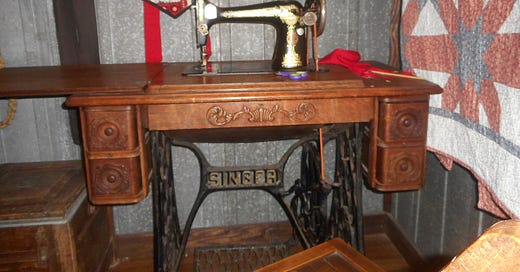Business Partners
(Photo of vintage Singer sewing machine from Wikimedia Commons )
Among inventors, Lila in my previous post is unusual in getting her invention out into the world where it can do some good and getting well rewarded for it. Both achievements only happen for a small minority of inventors.
For an example, look no further than the sewing machine. For that matter, narrow the story to the inventor of the sewing machine capable of lockstitch. Are you thinking it was Singer? Nope!
Notice how much went wrong for Elias Howe, Jr. who invented a sewing machine that could do lockstitching. His main investor George Fisher provided housing for Howe’s family and an amount of money that was handsome for the times, but Fisher didn’t help move the invention into the market. That was up to Howe and whoever he could enlist to help.
Notice also that patenting Howe’s invention didn’t protect it. Companies cheerfully made and sold machines based on his patent. Isaac Singer’s business was among those companies. The infringers had plenty of money they had made from Howe’s design. Howe was broke. He had to scrape together the means to challenge the infringers in court, over and over, until eventually the largest four agreed to a deal that paid him a fee for each machine they sold that used his design.
In my previous post, when Rose picked Lila’s invention to champion, Lila got the business partner she didn’t even realize she needed. More often an inventor stumbles along like Elias Howe, trying to do it all themselves. The inventor’s talent is invention, not business or dealmaking, so all manner of things go wrong.
Making the most of a good invention usually requires a business partner for the inventor. I mean that literally, a partner who is adept in commercial matters and trustworthy, like Rose in the previous post.
Even for a skilled dealmaker, it may not be smooth sailing. I know one who partnered with a small team of inventors and made a deal that should have been a golden ticket for all of them. Unfortunately, the company they made the deal with couldn’t figure out how to market their invention. Worse, the company sold its license rights to another business. The buyer in the other business knew exactly how to market the invention. The buyer has made millions with it… and refuses to pay more than a fraction of the license fees owed.
The buyer has nearly all the money, like Singer did. The inventors and dealmaker are at a disadvantage in their legal battle. Their case is solid. But a single weakness in the deal, allowing the license holder to sell the rights on to someone else without impediment, is making them fight hard to get the rest of what they are due. If their license deal had been more like a typical mortgage, transfer of the license would have required their approval. They would have had a chance to change the terms on which the buyer could get the license… or refuse to transfer it to someone who was likely not to pay.
In both of these cases, unlike Howe, the inventors teamed up with a good business partner. They got someone with strong scruples, commercially adept, persistent when things don’t go according to plan, and willing to carry out an honest and reasonable split of the proceeds. Superficially it’s the same as any other business partnership, combining different skills to make a better team. It’s also different, not running a day to day operation but instead seeking to craft at least one really good deal. Flurries of activity are interspersed with periods of waiting for a commercial target to decide whether to take the next step.
No one is perfect. The inventor’s creation probably has room for improvement. The dealmaker probably makes some missteps. They try to keep the mistakes in the realm of the recoverable, like what happened with the transferred license.
They try not to get too impatient, or complain too much, or start fighting with each other.
The hardest part is, once again, not the work. The hardest part isn’t inventing or seeking out and sealing the right deal. Just like in running projects, it’s the people.
Again.




